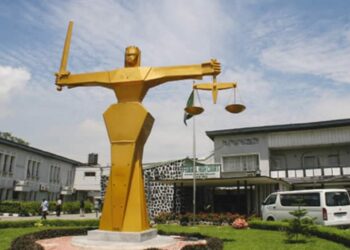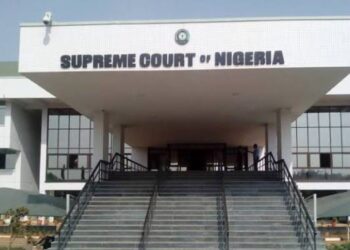The Federal Government of Nigeria has reacted to the decision of the Court of Appeal concerning the trial of Nnamdi Kanu, the leader of the Indigenous People of Biafra (IPOB).
Recall yesterday, the court of appeal in Abuja, in its judgment discharged Mr. Kanu of the remaining seven count charges proffered against him by the FG.
In a statement issued by Dr. Umar Gwandu, special assistant on media and public relations to the minister of Justice and attorney-general of the federation (AGF), Abubakar Malami noted that Mr. Kanu was only discharged but not acquitted.
According to him, the decision handed down by the court of appeal was on a single issue that borders on rendition, and other issues remained valid for judicial determination.
What the AGF is saying
The AGF revealed that the federal government will consider all available options open to them on the judgment on rendition while pursuing the determination of pre-rendition issues.
The statement reads “The Office of the Attorney General of the Federation and Minister of Justice has received the news of the decision of the Court of Appeal concerning the trial of Nnamdi Kanu. For the avoidance of doubt and by the verdict of the Court, Kanu was only discharged and not acquitted.
“Consequently, the appropriate legal options before the authorities will be exploited and communicated accordingly to the public.
“The decision handed down by the court of appeal was on a single issue that borders on rendition.
“Let it be made clear to the general public that other issues that predate rendition on the basis of which Kanu jumped bail remain valid issues for judicial determination.
“The federal government will consider all available options open to us on the judgment on rendition while pursuing determination of pre-rendition issues.”
What you should know
- The appellate court in its decision on Thursday held that the FG clearly violated international laws in the manner in which it extradited Kanu.
- The lower court has no jurisdiction to try Kanu on the remaining charges on the grounds of his rendition to Nigeria which violates the protocol on extradition and the OAU convention.
- The court held that the federal government failed to disclose the exact location Mr. Kanu was arrested; neither did the 15-count charge against him disclose the place, date, time, and nature of the alleged offenses before extraditing him.
- The three-man panel noted that the federal high court failed to look at the facts of Kanu’s extradition and has no jurisdiction to try Kanu on the remaining charges.
- Consequently, the court set aside the decision of the trial court to retain the remaining charges and discharged Mr. Kanu of the remaining charges against him.

























